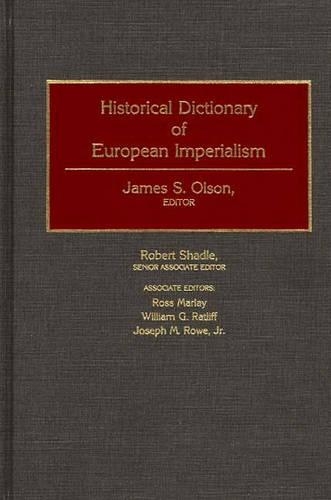
Historical Dictionary of European Imperialism
(Hardback)
Publishing Details
Historical Dictionary of European Imperialism
By (Author) James S. Olson
Bloomsbury Publishing PLC
Greenwood Press
30th September 1991
United States
Classifications
Tertiary Education
Non Fiction
European history
Reference works
325.32094
Physical Properties
Hardback
804
Description
Christopher Columbus' discovery of the new world launched a process of economic and cultural integration that continues to this day. In the wake of Columbus' voyages, the major powers of Western Europe established imperial systems that shaped global politics and economics for centuries. The "Historical Dictionary of European Imperialism" is designed to provide a ready reference tool for students and scholars of these systems. Its major focus is the Spanish, Portuguese, British, Dutch, French, German, Belgian, and Italian empires during the past 500 years. The Dictionary offers brief descriptive essays on a variety of topics - colonies, prominent individuals, legislation, treaties, conferences, wars, revolutions, and technologies. The individuals included have an historial significance that transcends their own countries. Essays on individual colonies usually end with the winning of independence or formal incorporation into the body politic of the mother country. References at the end of each entry provide sources of additional information for those interested in further research. Cross-references within the text help the reader to find related items. Three appendices provide a guide to contemporary languages in former colonial areas, a chronology of European imperialism, and a complete table of island systems in the world.
Reviews
This excellent volume contains a general overview of the European empires sine 1492. The approximately 800 essays, mostly descriptive, and about 60% of them under geographical headings, describe colonies, prominent individuals, legislation, treaties, conferences, wars, revolutions, and technologies.' The alphabetically arranged entries were cross-referenced. Appendixes offer a listing of the languages of the colonies, a chronology of imperialism, and a table of world island systems. This work has breadth but not depth. For example, Sir Frederick Lugard was one of the better known British colonial administrators in Africa in the late 19th and early 20th centuries, largely responsible for building the system of government known as indirect rule.' There is no separate entry for him; one locates him through the index, in entries on Nigeria and Uganda. The editor states that subsequent volumes on the individual national empires are planned; individuals such as Lugard would figure prominently in such a work. These additional volumes would add depth to this volume and would certainly constitute an invaluable resource. This is a thorough, well-written volume. Absolutely essential for all university, college, and large public libraries.-Choice
"This excellent volume contains a general overview of the European empires sine 1492. The approximately 800 essays, mostly descriptive, and about 60% of them under geographical headings, describe colonies, prominent individuals, legislation, treaties, conferences, wars, revolutions, and technologies.' The alphabetically arranged entries were cross-referenced. Appendixes offer a listing of the languages of the colonies, a chronology of imperialism, and a table of world island systems. This work has breadth but not depth. For example, Sir Frederick Lugard was one of the better known British colonial administrators in Africa in the late 19th and early 20th centuries, largely responsible for building the system of government known as indirect rule.' There is no separate entry for him; one locates him through the index, in entries on Nigeria and Uganda. The editor states that subsequent volumes on the individual national empires are planned; individuals such as Lugard would figure prominently in such a work. These additional volumes would add depth to this volume and would certainly constitute an invaluable resource. This is a thorough, well-written volume. Absolutely essential for all university, college, and large public libraries."-Choice
Author Bio
JAMES S. OLSON is Professor of History at Sam Houston State University, Huntsville, Texas. He is the author of Historical Dictionary of the Vietnam War, Historical Dictionary of the New Deal (Greenwood Press, 1988 and 1985, respectively), Saving Capitalism, Winning is the Only Thing, and more than 50 articles in professional journals.
